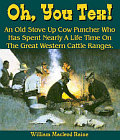- per page
Day was breaking in the Panhandle. The line-rider finished his breakfast of buffalo-hump, coffee, and biscuits. He had eaten heartily, for it would be long after sunset before he touched food again. Cheerfully and tunelessly he warbled a cowboy ditty as he packed his supplies and prepared to go.
I can truthfully say that my entire life has been spent with cattle. Even during my four years' service in the Confederate army, the greater portion was spent with the commissary department, in charge of its beef supplies. I was wounded early in the second year of the war and disabled as a soldier, but rather than remain at home I accepted a menial position under a quartermaster.
The horseman rode slowly toward the west, stopping once or twice to examine the wide circle of the horizon with eyes that were trained to note every aspect of the wilderness. On his right the plains melted away in gentle swell after swell, until they met the horizon. Their brown surface was broken only by the spiked and thorny cactus and stray bits of chaparral.
Based upon the Texan struggle for liberty against the power of Mexico, this revolution, epic in its nature, and crowded with heroism and great events, divides itself naturally into three parts.
Exactly twenty minutes after young Benton dismounted from his big rangy black before the door of a low adobe saloon that fronted upon one of the narrow crooked streets of old Las Vegas, he glanced into the eyes of the thin-lipped croupier and laughed. "You've got 'em. Seventy-four good old Texas dollars." He held up a coin between his thumb and forefinger. "I've got another one left, an' your boss is goin' to get that, too-but he's goin' to get it in legitimate barter an' trade."
Taken From Real Life from An Old Stove Up Cow Puncher Who Has Spent Nearly A Life Time On The Great Western Cattle Ranges. "My excuse for writing this book is money-and lots of it. I suppose the above would suffice, but as time is not very precious I will continue and tell how the idea of writing a book first got into my head.
When I first found employment with Lance Lovelace, a Texas cowman, I had not yet attained my majority, while he was over sixty. Though not a native of Texas, "Uncle Lance" was entitled to be classed among its pioneers, his parents having emigrated from Tennessee along with a party of Stephen F. Austin's colonists in 1821.
Within the memory of those of us still on the sunny side of forty the more remote West has passed from rollicking boyhood to its responsible majority. The frontier has gone to join the good Indian. In place of the ranger who patrolled the border for "bad men" has come the forest ranger, type of the forward lapping tide of civilization.
The following is the case of and for the people of the Republic of Texas. While referred to as a court case - it is a political question, since no government court or international court has jurisdiction to rule on the facts or its merits. The United States House of Representatives has refused to bring this political question to the floor of the House for over 140 years.
It is very curious that much of the history of the United States in the Forties and Fifties of the last century has vanished from the general memory.
Colonel Melendez, after leaving the Jaguar, galloped with his head afire, and panting chest, along the Galveston road, exciting with his spurs the ardour of his horse, which yet seemed to devour space, so rapid was its speed. But it is a long journey from the Salto del Frayle to the town.
As the air was mild and the sky serenely blue (though you can never tell about a Texas Norther), she took Sir Slicker by the nape of his collar-band and dropped him out of the window to be lashed to the saddle; then she turned to the mirror again, and, having done the best she could with the hat, she went to take leave of the farmer's family, who, as she judged by certain sounds, were assembled at the front of the house awaiting her departure.
- per page






















